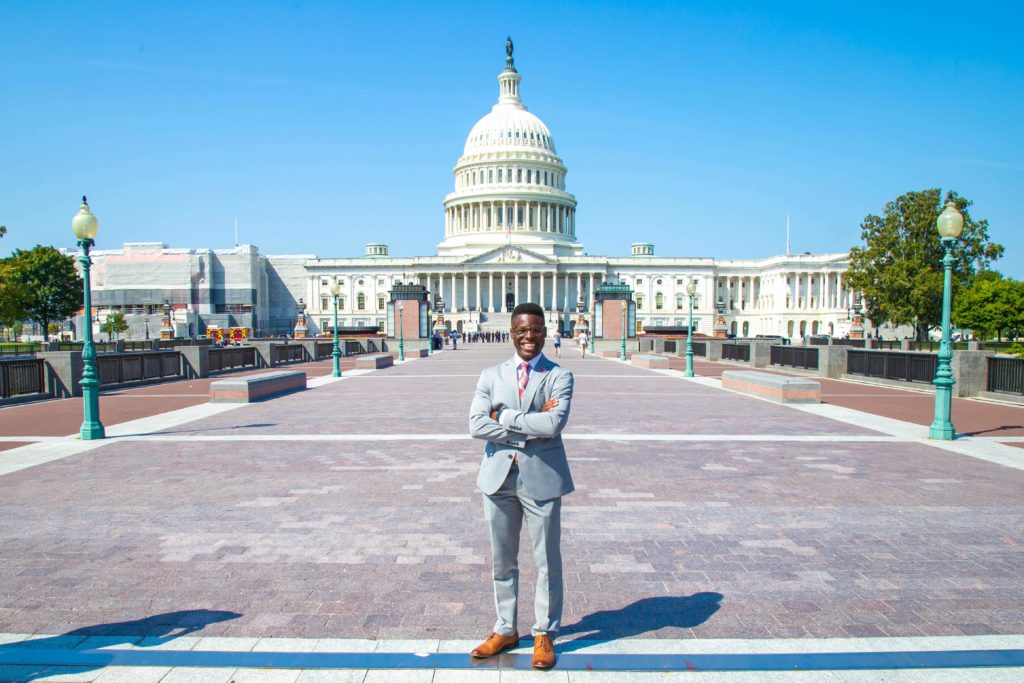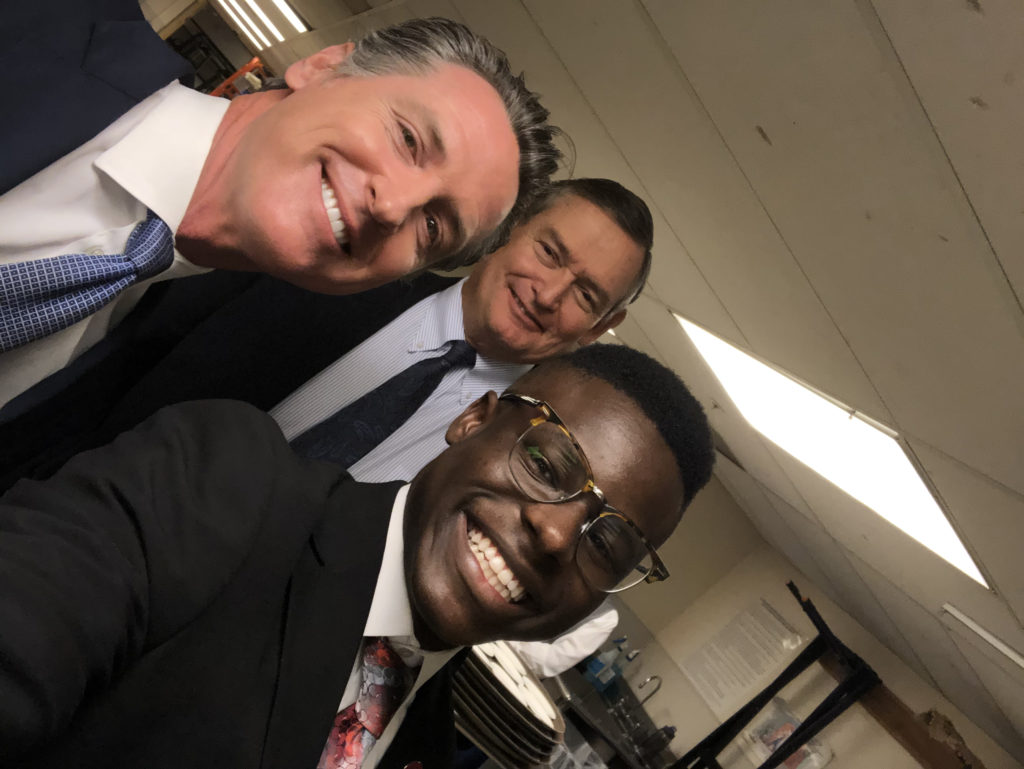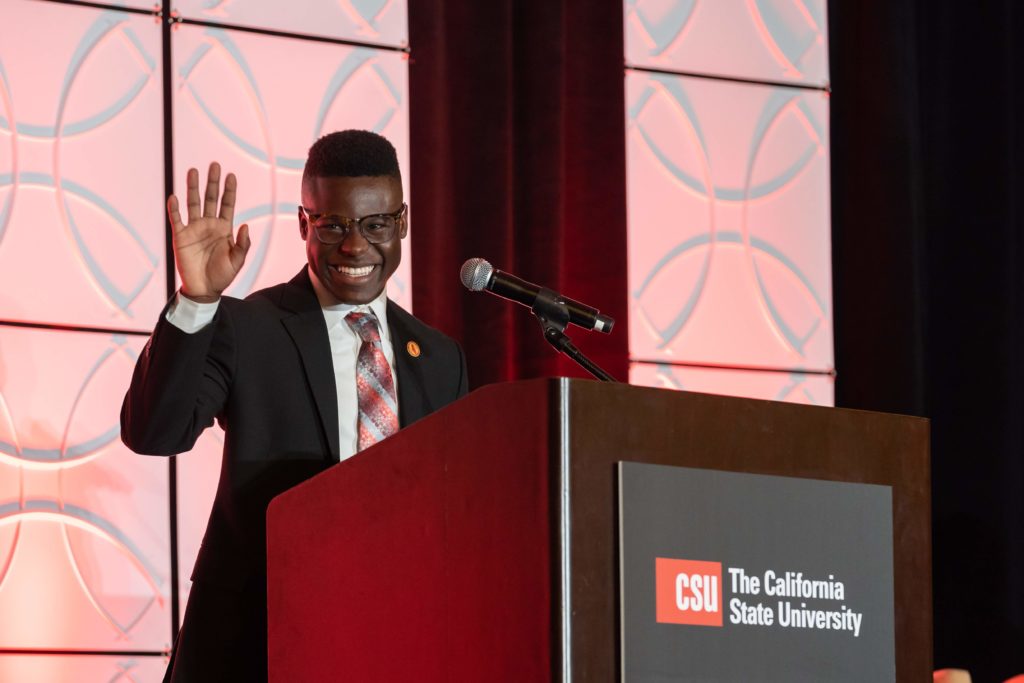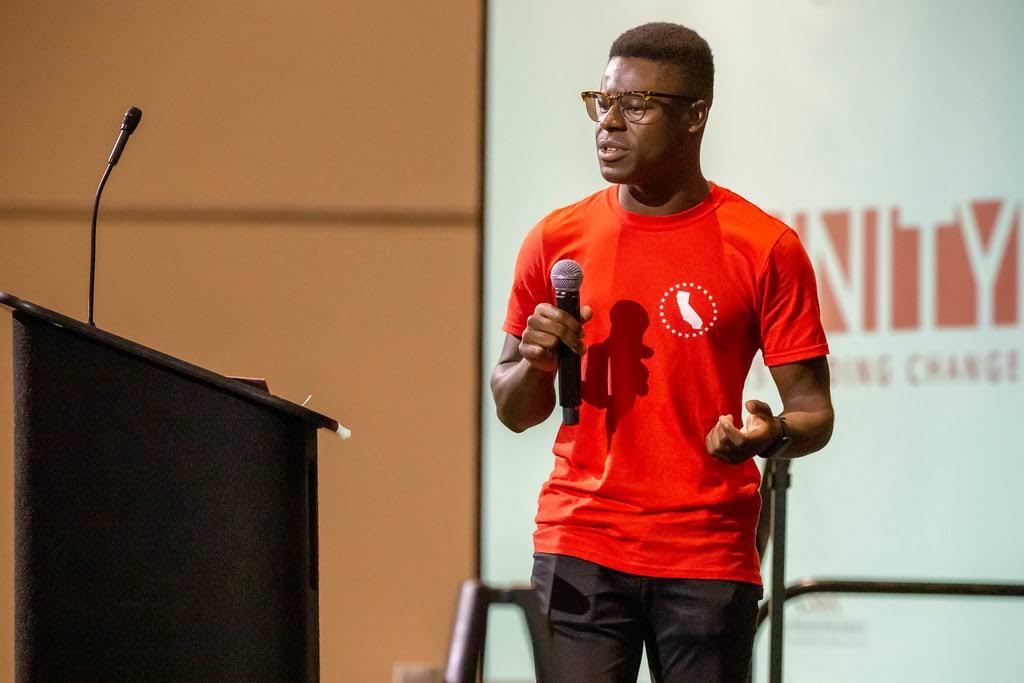A core belief of Youth Leadership Institute is that there can only be true justice and community change if those most affected are a part of decision-making. Young people must have a place “at the table” in order to make our communities places where everyone has the opportunity to thrive. It is yli’s job to run programs and trainings to make sure that young people are included at the table as often as possible so that youth voice will shape the future we are building together.
Read Michael Wiafe’s story below, and consider investing in youth at the table this holiday season. Click here to contribute!

“Where is home?” That has always been a difficult question. It really depends on who I’m talking to. When other immigrants talk about “home,” they don’t always mean where they have spent the most time. They are talking about roots. When I think about roots, they’re not here. I was born in Ethiopia, but neither of my parents are Ethiopian. My dad is from Ghana, and my mom is from Zambia. We moved to the U.S. when I was 9 months old.
It can be hard for these folks to appreciate what home actually means to me in my brain – if I consider the U.S. to be my home, it feels like a betrayal of where I was born, where my family is from. On the other hand, I sometimes get that question, “Where are you really from?” which is a whole other can of worms for people of color who are often treated as though we don’t belong here. Loma Linda, California feels the most “home” to me. It’s where I grew up, and my family still lives there.
I first started thinking about doing a podcast after the murders of George Floyd and Breonna Taylor, and the protests they sparked. The national conversation barely involved young people even though young people were on the ground doing most of the work. Young people have a lot to say. And we’re not having as much influence in the policy world as we should. By putting policy people in conversation with young people, I felt like I might be able to bridge that divide.
Demi Wack was the first person I reached out to with my idea. We are both on California Forward’s Young Leaders Advisory Council, which was formed after last year’s California Economic Summit in partnership with Youth Leadership Institute. The Council consists of 20 young Californians from diverse backgrounds who aim to increase activation in policy discussions among younger generations. We have spent a lot of time thinking about what problems to tackle and what actions to take to influence other youth. The group had so many different ideas, different passions. I felt like a podcast would make room for everyone to pursue a piece of their passion and talk about the kinds of policies that interested them.
After a lot of dreaming and discussion, we named the podcast PolicyWise, envisioning it as a space for intergenerational policy discussions centered around today’s youth.
Our first episodes were really focused on the November election. We wanted young people to be informed about what they might be voting on. Our process has been to explore what youth are currently talking about to come up with a topic and then identify individuals – policy leaders and youth leaders – and pair them up. Episode 4 is a great example, featuring one of our youth advisory members, Eli Arzbaecher. She is extremely passionate about sustainability, so we paired her up with California Public Utilities Commission senior legislative consultant, Grant Mack.
One fascinating pattern I’ve noticed as these conversations have unfolded is how our guests share a passion for the topic, but come to the work from a vantage point that is particular to the moment in which they grew up. Grant first got involved in sustainability as a youth because nothing was being done to address it on his college campus. He galvanized student leadership to push for sustainability measures, and the conversations were primarily focused on science. Several generations later, when Eli gets involved, the conversation has shifted toward equity and environmental justice. The work Grant did was foundational to Eli’s work, but there’s been a turning point that opens up all of this space for growth. Younger people stand on the shoulders of those who came before, and – because of that – they can see a lot more and reach a lot further.
I’ve also found that the benefits of this podcast are as much for the guests as they are for the listeners. The youth are able to connect afterwards with leaders in the fields they are interested in, and even form mentorships.
There are at least two big benefits for policy leaders. The first is getting the perspective of the young person who sees the issue in a very different way, who lives in a different world. Policy can go very wrong if it doesn’t include the perspectives of young people – especially if it’s a policy that impacts young people. The world is different now: we have social media, the job market looks very different, climate change is in a different phase, inequity is rampant. As society progresses, young people’s view of the future is more representative of what the future will actually look like. Older generations have created a foundation, a system, an infrastructure – but things need to evolve. It is also a reality that policies are rarely passed fast enough to address the moment in which they were created. They tend to fall on the next generation, who are affected by that policy for the longest amount of time, and who then become responsible for changing it in the future.

The second benefit to policy leaders is reconnecting with inspiration. Oftentimes, the policy person has been doing their work for many years, and haven’t had those passion moments in a long time. In connecting with youth, they are reminded why they were passionate about this issue in the first place – they see themselves mirrored in the young people. So passion becomes a bridge that connects these two people – and the possibilities open for sound policy that impacts a larger constituency than it might otherwise.
As for the audience, our intention has been to put something out there that makes youth feel both the desire and agency to get engaged. We want to break it down and see inside the intricacies of policy so that youth can discover their passion. There is so much built into the system that makes it difficult for average people to get involved, let alone marginalized communities. The policy world can be very detached from and inaccessible to the people on the ground who are experiencing impacts.
We are also trying to build a sense of agency in young people who aren’t normally encouraged to get involved in the change they want to see in the world. Mostly, we’re told to get good grades, not to think about what we want to do in future. We’re not even exposed to government and civics until our senior year of high school. That was the first time I began to understand what politicians are doing, what was happening, what they were trying to accomplish – and that government might be important. We’re not fostering a culture of civic engagement. Most of us have no idea that civic engagement is not only for those who can vote. There are so many ways to get it done, but we don’t necessarily learn those ways, at least not through the education system. I think we need to be more intentional about teaching young people about how the government works, and grow that passion at a younger age.
I remember the first moment when I thought about making political change. It was when I learned that I couldn’t run for president. When the teacher said I couldn’t run because of where I was born, I thought, “What? Just like that?” It’s ridiculous – I came here 9 months late. I didn’t even have a living memory of where I was born until I visited when I was 10 years old. People need to find these things out earlier rather than later to have a culture of civic engagement. We want our podcast to break the stigma that it’s not for youth. Hopefully, we can be that avenue for young people, which is why we always ask the policy leaders on our podcast to share actionable ways young people can get involved in their work.

Another growing misconception about policy that I want to tackle is around the effort involved to make change. A lot of youth think that only those going against the grain, like Bernie Sanders and AOC, are really “for the people.” But there are advocates fighting in Capitols all across the country – just because you haven’t seen them in the media doesn’t mean they aren’t there. Most policy professionals are passionate just like we are, and it’s not fair to put the entire burden of the system on their shoulders. When I first became a student leader, I thought, “I’m going to stir things up!” I thought about all of the problems that needed to be talked about, and all of the changes that needed to occur. But there are nuances and constraints to public positions and policy-making. In Episode 2, for example, Assemblymember Dr. Shirley Weber describes her work on racial equity in California. She has tried to push through a lot of bills that have failed, including Prop 16, the most recent ballot measure that attempted to reinstate affirmative action. There’s a lot going on in Sacramento, for example, but unless you are introduced to that world, it’s hard to see changes being made.
We’re always thinking of government as “a system,” but it is really just a bunch of people talking to each other. And they disagree more than they agree. So it can be hard to develop one distinct plan. It’s not that simple to just make things happen. A lot of policy-makers are doing what they can, and can’t always act in the way they want to. This is why it’s so important to have allies to get things done. I also think it’s critical to support representatives of color – not just getting those people into office, but continuing to support them as they fight to push through initiatives on our behalf. We tend to have very high expectations of our folks of color – that they’ll be able to correct all the wrongs. This pressure and feeling of responsibility adds up to an additional burden that other policymakers don’t experience.
Finally, a big issue for me – and an outcome we hope to have with our podcast – is getting youth to vote. We’re headed there, with an historic 50% turnout in the last election. But we need to do better. Voting has such a long chain of impact beyond just selecting who is in office. Voting as a block lets our electeds know that we have priorities as a constituency. Right now, campaigns are geared towards older people because they vote. Candidates are not going to spend dollars or make campaign promises to a constituency that isn’t going to vote. When we don’t show up, we aren’t considered important and our concerns are not represented. Youth have been taught to sit down and listen to the teacher, to think that we don’t have power to speak up, to stand up. I want us to be vocal in our communities, to not just take things sitting down.

Ultimately, I think that in a truly representative society, all voices would be heard. I don’t know if there’s necessarily an equation or formula for this, but I imagine a society in which all people are able achieve their dreams regardless of the circumstances into which they were born. I’d love to build a world where there is political equality – where ideas win, not money, and there is a fair process for gathering all the information needed to make decisions. What does it take to change it? If government is just a group of people deciding things together, then change requires a group of people sitting down and deciding something else. It was designed to be changed and we can change it. Sometimes, just speaking up and voicing our concerns and solutions can create new legislation. If you care about it, you can make a difference in it. All that is needed is the will to do it.
Michael Wiafe was the President of the California State Student Association – representing the largest 4-year student body in the nation. Demi Wack was the President of Fresno State’s Student Association. Together, they host the PolicyWise podcast. Follow the links below to learn more about Michael’s work.
Articles:
- SDSU Alumni Start Podcasts to Empower Generation Z
- Making Good on the Promise of California Higher Education
- CSU Considers New Quantitative Reasoning Course Requirement for New Applicants
- Student Advocates Call for Financial Aid Reform in Governor’s Budget
- SDSU Black Student Leaders Discuss Breaking Down Barriers
- Mr. President
Videos:
- CSU Young Men of Color Forum Full Session Speaker
- CSU Graduation Initiative 2025 Morning Keynote with Governor Newsom
- CNN Newsroom with Poppy Harlow and Jim Sciutto
- Fox 5 San Diego with Rauol Martinez
- July 2019 CSU Board of Trustees Report
- September 2019 CSU Board of Trustees Report
